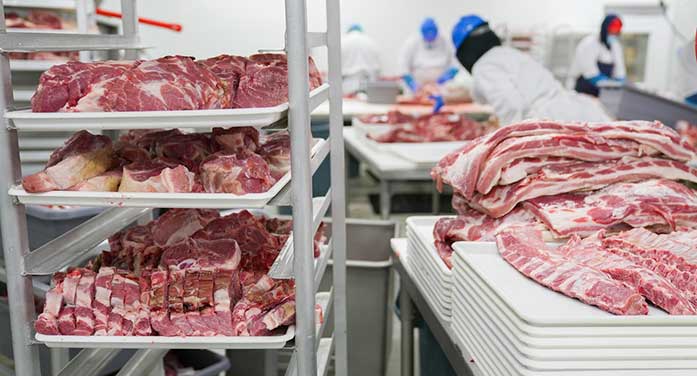 United States President Joe Biden recently introduced a billion-dollar program to lower food inflation by increasing competition in meat-packing. It’s likely ill-fated.
United States President Joe Biden recently introduced a billion-dollar program to lower food inflation by increasing competition in meat-packing. It’s likely ill-fated.
A few weeks ago, a damning report out of Washington suggested the top U.S. meat-packing plants have increased profit margins by 300 percent since the beginning of the COVID-19 pandemic.
The report, prepared by White House economic advisers, didn’t sit well with Biden.
Consolidation in the meat-packing industry has been an ongoing issue in many parts of the world. In the United States, four dominant companies – Tyson Foods, JBS, Marfrig and Seaboard Foods – control as much as 85 percent of the meat-packing business.
Biden has openly blamed this big four for skyrocketing prices at the meat counter.
While food inflation has been at about 6.4 percent in the United States over the last few months, meat prices have risen by more than 12 percent in the last year.
Meanwhile, farmers are getting less for their product.
The Biden administration plans to tackle the lack of competition by supporting smaller and independent meat-packers. Since buying local and food inflation are top-of-mind for Americans, it’s a no-brainer political move for the administration.
And, of course, Americans love their meat – they’re among the top meat eaters in the world. Americans eat almost 240 pounds of meat a year on average. Canadians eat about 150 pounds of meat a year, and that’s a lot, but America’s love affair with meat is unique.
In Canada, three plants process about 85 percent of all the beef produced in Canada. For pork, oligopolistic forces aren’t as significant; we have dominant players like Olymel and Maple Leaf, but we also have smaller players. The poultry sector is also more balanced than in the U.S.
Still, meat prices have gone up by more than 10 percent in the last year in many parts of Canada, and that’s more than double the rate of food inflation in general. Many blame meat-packing companies for gouging consumers.
Canadians haven’t seen a report similar to the one the White House produced, so we don’t know what the situation looks like here.
But food processing is challenging and it’s even tougher for meat packing. Food safety standards and other regulations make it close to impossible to start a new federally-licensed plant, a facility capable of selling out-of-province or overseas.
Regional abattoirs, which can only transact within a province, have less reason to worry.
Distribution costs are also considerable in Canada.
But the biggest cost is labour. It has always been an issue for the sector, but the pandemic has made things much worse. While Cargill, Exceldor and Olymel are offering better working conditions and higher wages and benefits to workers, the increased use of robotics is inevitable. It’s happening everywhere, including in Canada. Capitalizing operations will add more financial pressure on meat-packers.
Seeing different market dynamics within the supply chain in a time of crisis isn’t new. When the mad cow crisis hit in 2003, beef producers saw the money they were paid plummet by more than 70 percent while retail prices barely moved. Ranchers and consumers were upset.
 Over 300 meat-packing projects were launched, largely driven by the anger of beef producers toward meat-packers, who were profiting from the crisis. In the end, only two federally-licensed slaughterhouses saw the light of day – after a few years of work.
Over 300 meat-packing projects were launched, largely driven by the anger of beef producers toward meat-packers, who were profiting from the crisis. In the end, only two federally-licensed slaughterhouses saw the light of day – after a few years of work.
And it appears both facilities have been closed for years. While there are concerns about meat-packing practices in Canada, it’s simply not an easy business.
More government intervention to change market conditions can only go so far.
Most would agree that more regional processing is critical. But the economics of meat processing make it difficult for any company to survive unless volume and capacity are achieved, especially in Canada.
And for taxpayers who don’t eat meat and believe the sector should be outlawed, seeing governments provide financial support to the sector may not be welcome.
Still, some intervention is called for if meat packers are colluding in the way we saw with bread a few years ago.
If the Biden administration wants to change rules, create more competition and ease the financial burden on American families to score some political points, so be it. Government-induced competition rarely works and Biden’s program likely won’t be effective.
This is more about smoke and mirrors, and Biden knows it.
Dr. Sylvain Charlebois is senior director of the agri-food analytics lab and a professor in food distribution and policy at Dalhousie University.
Sylvain is one of our contributors. For interview requests, click here.
The opinions expressed by our columnists and contributors are theirs alone and do not inherently or expressly reflect the views of our publication.
© Troy Media
Troy Media is an editorial content provider to media outlets and its own hosted community news outlets across Canada.



So inflation has increased to 9.1% and employers have raised salaries by another 3.4% and Biden is complaining about their rising costs by 12%? Let’s see for Joe, 9.1 plus 3.4 equals what, oh yes 12.5%. What is this guy Biden smoking perhaps the same as his son?